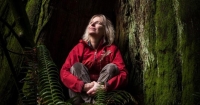NRESi Colloquium: Signals from the Mother Trees - Dr. Suzanne Simard (UBC).
 In three decades of studying interspecific relationships in the forests of Canada, we have discovered that trees not only compete with each other, but also connect, communicate and cooperate through belowground mycorrhizal fungal networks. The largest trees are hubs of the networks, where they link with other trees and plants. The big trees convey resources such as carbon, nitrogen and water, and these are transmitted down source-sink gradients to smaller trees, resulting in a redistribution of matter and information throughout the forest. The big hub trees also facilitate the regeneration of new seedlings, particularly their own offspring, enhancing their survival and growth, and we have therefore taken to calling the hubs, “mother trees”. When the mother trees become sick or damaged, they transmit even more resources to the surrounding individuals, as well as defense information that enhances the recipient’s resistance to the disturbance. Deciphering such communications will take considerable more research, but it is clear that mother trees have a voice and what they have to say is crucial to forest resilience. In working with the Aboriginal people of British Columbia, we have learned that these discoveries resonate with traditional ecological knowledge. Based on this knowledge, and in collaboration with indigenous people, academics, government and the forest industry, we launched “The Mother Tree Project” in the Douglas-fir forests of British Columbia in 2015. This rigorous experiment, where we are testing how best to retain mother trees during harvesting so the forest remains resilient as climate changes, is designed as a hub for a century of collaborative research. It includes nine replicated forests that cover the climatic envelope of interior Douglas-fir, across which we are comparing five patterns of mother tree retention, from clearcutting to partial retention to no-harvest controls. The mother tree retention treatments have been planted with a wide range of species as well as local and migrated genotypes of Douglas fir, creating diverse mixes of regenerating trees that should enhance resource uptake and decrease risk of catastrophic mortality. We are finding these practices are affecting key ecological structures and functions, including species diversity, carbon storage, and forest regeneration. This presentation tells the story of the origins of The Mother Tree Project, provides early results, lays out a vision for globalization of the project, and gives information on how to get involved.
In three decades of studying interspecific relationships in the forests of Canada, we have discovered that trees not only compete with each other, but also connect, communicate and cooperate through belowground mycorrhizal fungal networks. The largest trees are hubs of the networks, where they link with other trees and plants. The big trees convey resources such as carbon, nitrogen and water, and these are transmitted down source-sink gradients to smaller trees, resulting in a redistribution of matter and information throughout the forest. The big hub trees also facilitate the regeneration of new seedlings, particularly their own offspring, enhancing their survival and growth, and we have therefore taken to calling the hubs, “mother trees”. When the mother trees become sick or damaged, they transmit even more resources to the surrounding individuals, as well as defense information that enhances the recipient’s resistance to the disturbance. Deciphering such communications will take considerable more research, but it is clear that mother trees have a voice and what they have to say is crucial to forest resilience. In working with the Aboriginal people of British Columbia, we have learned that these discoveries resonate with traditional ecological knowledge. Based on this knowledge, and in collaboration with indigenous people, academics, government and the forest industry, we launched “The Mother Tree Project” in the Douglas-fir forests of British Columbia in 2015. This rigorous experiment, where we are testing how best to retain mother trees during harvesting so the forest remains resilient as climate changes, is designed as a hub for a century of collaborative research. It includes nine replicated forests that cover the climatic envelope of interior Douglas-fir, across which we are comparing five patterns of mother tree retention, from clearcutting to partial retention to no-harvest controls. The mother tree retention treatments have been planted with a wide range of species as well as local and migrated genotypes of Douglas fir, creating diverse mixes of regenerating trees that should enhance resource uptake and decrease risk of catastrophic mortality. We are finding these practices are affecting key ecological structures and functions, including species diversity, carbon storage, and forest regeneration. This presentation tells the story of the origins of The Mother Tree Project, provides early results, lays out a vision for globalization of the project, and gives information on how to get involved.
The Natural Resources & Environmental Studies Institute (NRESi) at UNBC hosts a weekly lecture series at the Prince George campus. Anyone from the university or wider community with interest in the topic area is welcome to attend. Presentations are also made available to remote participants through Zoom Webinar. Go to http://www.unbc.ca/nres-institute/colloquium-webcasts to view the presentation remotely.
Past NRESi colloquium presentations and special lectures can be viewed on our video archive, available here.
Contact Information
Al Wiensczyk, RPF
Research Manager,
Natural Resources and Environmental Studies Institute
Phone: 250-614-4354
Phone: 250-960-5018
Email: al.wiensczyk@unbc.ca
